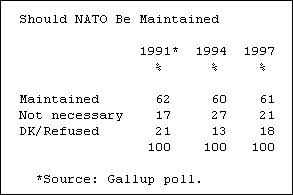Survey Findings
The American public continues to support the North Atlantic Treaty Organization (NATO) but is uninterested and equivocal about the question of expanding the alliance to include some former Soviet satellites in East Europe. A Pew Research Center poll found a 61% majority favoring maintaining NATO despite the end of the Cold War. However, only a narrow plurality want its membership expanded (45% to 40%). Few Americans are thinking about the issue — just 20% have followed the debate about enlargement very closely (5%) or fairly closely (15%). Among this engaged segment of the public, however, enlargement was backed by a strong majority (54% vs. 37%).

The poll also found a narrow plurality would broaden NATO’s mission beyond Europe to defend Western interests outside of the continent, such as in the Persian Gulf (49% vs. 38%). The public gave majority support for other proposed new NATO missions including combatting international terrorism and drug trafficking (both 51%) and peacekeeping operations within and near its borders (56% and 54%, respectively).
Whether the 50-year-old security alliance should be expanded geographically as well as in terms of its mission is expected to be the most difficult foreign policy issue President Clinton will face this year. A decision is expected at the NATO summit meeting in July with any expansion subject to Senate ratification. Russia appears adamantly opposed, claiming that the admission of Central European states — Poland, Hungary and the Czech Republic are the most likely to be admitted initially — would represent hostile advancement of NATO toward its borders. Opponents fear that expansion could abort the democratic evolution in Russia and even revive the Cold War. Proponents claim that expansion is not only in America’s interest but that conversely, failure to expand geographically, after all the arguments, could also have negative effects.1
For example, almost twice as many Americans in the poll said they were more concerned that Russia will be encouraged to again threaten its European neighbors if NATO is not expanded than said a NATO expansion will anger Russia (41% vs. 24%). Among those respondents who have followed the issue closely, the margin fearing an emboldened rather than an angry Moscow was somewhat greater (46% vs. 24%).
The Pew survey of 1,503 adult Americans conducted January 9- 12, 1997 also found that foreign affairs in general do not enjoy much priority for the American people these days. Fully 86% said domestic policy was more important for Mr. Clinton to focus on right now, with merely 7% saying foreign policy. However, the public took notice of the President’s Secretary of State designate, Madeleine Albright and responded positively. Her 57% – 16% favorable rating is much higher than that of her predecessor, Warren Christopher, (34% – 21%).
In their attitude toward NATO, 53% said their opinion was favorable (9% very, 44% mostly). This was a drop from 61% favorable in June 1995, but that earlier poll followed a period of widely reported NATO action including air strikes in Bosnia and the downing of an American F-16 fighter plane. The broader question, of whether NATO should be maintained or is no longer necessary, drew much the same answers as in previous years: 61% vs. 21% now, compared to 60% two years ago and 62% in 1991.2 Among those who followed the NATO issue closely now, 70% said the alliance should be maintained.
While support for NATO expansion was relatively narrow at 45% to 40%, the demographic breakdown shows that college-educated Americans favor enlargement more than those who never attended college (62% vs. 34%), and men more than women favor enlargement (49% vs. 41%) — particularly middle aged men (56% of those 30 to 49 years old). No significant difference in support was found across party lines, but those who voted for Clinton last November were more in favor of expansion (51%) as were respondents in all regions of the country except the South (40% in favor).
Support For Enlargement General In Nature
Pew respondents who supported expansion volunteered reasons that were broadly inclusive, such as “the larger the better,” with almost no mention of a revived Russia again threatening the region. Those who opposed expansion (and followed NATO events closely) offered a wide range of specific reasons including distrust of the East European countries, concern about the additional cost to the United States in money and manpower, and fear of “boxing in the Russians.”
The disengaged nature of public opinion about expanding NATO geographically suggested that with visible leadership, more Americans might favor the move. However in a small test of the thesis, the results were equivocal at best, and at worst, contrary to expectations:
Half of respondents were asked simply whether NATO should be enlarged or stay as it is: 45% said expand, 39% said stay as is. The other half of respondents were asked the same question after being told that President Clinton and Republican Congressional leaders believe NATO should be expanded. Then 46% said expand, 40% said stay as is. The different results are not statistically significant.
Among those who follow the issue closely, of those responding to the simple form of the question, 56% said expand, 36% said stay as is. When the question was preceded by noting leadership support, however, only 51% of the well-informed public said expand, 39% said stay as is. These results are marginally significant.




